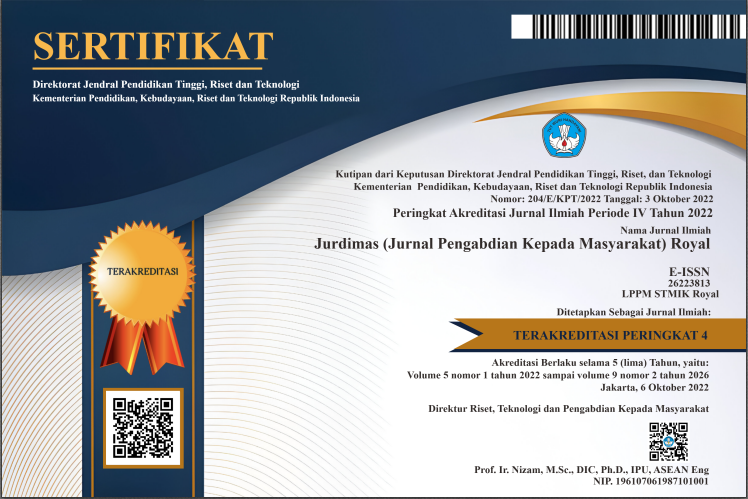Peningkatan Kapasitas Kewirausahaan Mahasiswa Melalui Bootcamp Trilogi Got Business Founder
Abstract
The development of entrepreneurship among students has become a priority in higher education in Indonesia to address unemployment, leading Universitas Trilogi to organise the Trilogi Got Business Founder Bootcamp with the theme “Scaling the Future of Business: Sustainable and Responsible Innovation.†The aim of this activity is to provide in-depth understanding and practical skills in key aspects of entrepreneurship, including product development, digital marketing, and financial reporting. The bootcamp employed three main stages: preparation, implementation, and evaluation. The preparation stage involved scheduling, selecting speakers, and arranging facilities. The implementation stage comprised lectures, discussions, exercises, and case studies delivered by competent experts in their respective fields. The evaluation stage was conducted through questionnaires to assess the success of the event and its impact on participants. The evaluation results showed that the majority of participants were satisfied with the content delivered and the relevance of the activities to their needs. The methods used were effective in enhancing participants' understanding and practical skills in entrepreneurship. Overall, this bootcamp successfully achieved its objectives and made a positive contribution to the development of entrepreneurial capacity among students at Universitas Trilogi.
Keywords: bootcamp; digital marketing; entrepreneurship; sustainable innovation; university students
Abstrak: Pengembangan kewirausahaan mahasiswa menjadi prioritas pendidikan tinggi di Indonesia untuk mengatasi pengangguran, mendorong Universitas Trilogi mengadakan Bootcamp Trilogi Got Business Founder dengan tema “Scaling the Future of Business: Sustainable and Responsible Innovationâ€. Tujuan kegiatan ini adalah untuk memberikan pemahaman mendalam dan keterampilan praktis dalam aspek-aspek penting kewirausahaan, termasuk pengembangan produk, pemasaran digital, dan pembuatan laporan keuangan. Metode yang digunakan dalam bootcamp ini mencakup tiga tahap utama: persiapan, pelaksanaan, dan evaluasi. Tahap persiapan melibatkan perencanaan jadwal, pemilihan narasumber, dan penyediaan fasilitas. Tahap pelaksanaan terdiri dari ceramah, diskusi, latihan, dan studi kasus yang dilakukan oleh narasumber berkompeten di bidangnya. Tahap evaluasi dilakukan melalui kuesioner untuk menilai keberhasilan kegiatan dan dampaknya terhadap peserta. Hasil evaluasi menunjukkan bahwa mayoritas peserta merasa puas dengan materi yang disampaikan dan relevansi kegiatan dengan kebutuhan mereka. Metode yang digunakan efektif dalam meningkatkan pemahaman dan keterampilan praktis peserta dalam kewirausahaan. Secara keseluruhan, bootcamp ini berhasil mencapai tujuannya dan memberikan kontribusi positif terhadap pengembangan kapasitas kewirausahaan di kalangan mahasiswa Universitas Trilogi.
Kata kunci: bootcamp; inovasi berkelanjutan; kewirausahaan; mahasiswa; pemasaran digital
References
Baskoro, M. L., & Maulidian, M. (2019). Pelatihan Instagram Marketing Untuk Tenant Inkubator Bisnis Trilogi. Jurdimas (Jurnal Pengabdian Kepada Masyarakat) Royal, 2(1), 19–26. https://doi.org/10.33330/jurdimas.v2i1.315
Bell, R., & Bell, H. (2020). Applying educational theory to develop a framework to support the delivery of experiential entrepreneurship education. Journal of Small Business and Enterprise Development, 27(6), 987–1004. https://doi.org/10.1108/JSBED-01-2020-0012
Hisrich, R. D., Peters, M. P., & Shepherd, D. A. (2017). Entrepreneurship. McGraw-Hill Education.
Maritz, A. (2017). Illuminating the black box of entrepreneurship education programmes: Part 2. Education and Training, 59(5), 471–482. https://doi.org/10.1108/ET-02-2017-0018
______, M., Puspitawati, M. D., Novita, N., Ramayanti, R., Dahlia, L., & Purnengsih, I. (2024). Green Entrepreneurship Incubation Model for Students at Trilogy University Business Incubator: A Literature Review. E3S Web of Conferences, 483, 1017.
______, M., Sumiasih, I. H., Puspitawati, M. D., & Seftiono, H. (2022). Pelatihan Pola Pikir Wirausaha Terhadap Perubahan Pada Tenant Fakultas Bioindustri, Universitas Trilogi. Jurdimas (Jurnal Pengabdian Kepada Masyarakat) Royal, 5(2), 151–158.
Morris, T. H. (2020). Experiential learning–a systematic review and revision of Kolb’s model. Interactive Learning Environments, 28(8), 1064–1077. https://doi.org/10.1080/10494820.2019.1570279
Nabi, G., Liñán, F., Fayolle, A., Krueger, N., & Walmsley, A. (2017). The impact of entrepreneurship education in higher education: A systematic review and research agenda. Academy of Management Learning & Education, 16(2), 277–299.
Obschonka, M., Hakkarainen, K., Lonka, K., & Salmela-Aro, K. (2017). Entrepreneurship as a twenty-first century skill: entrepreneurial alertness and intention in the transition to adulthood. In Small Business Economics (Vol. 48, Issue 3, pp. 487–501). https://doi.org/10.1007/s11187-016-9798-6
Vicente-Ramos, W., & Cano-Torres, L. M. (2022). The effect of digital marketing on the management of relationships with university students in times of covid-19. International Journal of Data and Network Science, 6(1), 59–66. https://doi.org/10.5267/J.IJDNS.2021.10.004
Warren, C. S., Reeve, J. M., & Duchac, J. E. (2018). Accounting. Cengage Learning.














